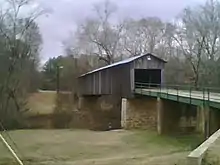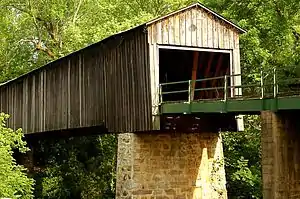Euharlee, Georgia | |
|---|---|
 Euharlee Creek Covered Bridge | |
 Location in Bartow County and the state of Georgia | |
| Coordinates: 34°8′50″N 84°56′11″W / 34.14722°N 84.93639°W | |
| Country | United States |
| State | Georgia |
| County | Bartow |
| Incorporated | January 1, 1976[1] |
| Named for | "she laughs as she runs" in Cherokee language.[1] |
| Government | |
| • Mayor | Craig B. Guyton[2] |
| • City Manager | James Stephens |
| Area | |
| • Total | 5.56 sq mi (14.40 km2) |
| • Land | 5.40 sq mi (14.00 km2) |
| • Water | 0.16 sq mi (0.40 km2) |
| Elevation | 682 ft (208 m) |
| Population (2020) | |
| • Total | 4,268 |
| • Density | 789.79/sq mi (304.94/km2) |
| Time zone | UTC-5 (Eastern (EST)) |
| • Summer (DST) | UTC-4 (EDT) |
| ZIP codes | 30120, 30145 |
| Area code(s) | 770/678/470 |
| FIPS code | 13-27988[4] |
| GNIS feature ID | 0313985[5] |
| Website | www |
Euharlee is a city in Bartow County, Georgia, United States. The population was 4,136 at the 2010 census,[6] an increase of 29% over the 2000 count of 3,208.
Euharlee is a bedroom community of Cartersville, the Bartow County seat which is located 9 miles (14 km) to the east. They are connected through Euharlee Road, and by a chain of subdivisions and homes. Euharlee is located next to Plant Bowen, which has the second-largest generating capacity of any coal-fired power plant in the United States.
History
Euharlee was originally called Burge's Mill by settlers as early as the 1840s.[7] The town was incorporated as Euharlee by the General Assembly of Georgia on September 16, 1870.[8] "Euharlee" is a name derived from the Cherokee language, meaning "she laughs as she runs", referring to the sound of the Euharlee Creek.[9]
Geography
Euharlee is located in southwestern Bartow County at 34°8′50″N 84°56′11″W / 34.14722°N 84.93639°W (34.147174, -84.936445).[10] The Etowah River, part of the Alabama River watershed, flows through the eastern part of the city. Euharlee Creek joins the river just south of the center of town and is crossed by the Euharlee Covered Bridge, one of the oldest covered bridges in Georgia.
According to the United States Census Bureau, the city has a total area of 5.4 square miles (14.1 km2), of which 5.3 square miles (13.7 km2) is land and 0.15 square miles (0.4 km2), or 2.83%, is water.[6]

Demographics
| Census | Pop. | Note | %± |
|---|---|---|---|
| 1880 | 24 | — | |
| 1890 | 144 | 500.0% | |
| 1980 | 477 | — | |
| 1990 | 850 | 78.2% | |
| 2000 | 3,208 | 277.4% | |
| 2010 | 4,136 | 28.9% | |
| 2020 | 4,268 | 3.2% | |
| U.S. Decennial Census[11] | |||
2020 census
| Race | Num. | Perc. |
|---|---|---|
| White (non-Hispanic) | 3,370 | 78.96% |
| Black or African American (non-Hispanic) | 348 | 8.15% |
| Native American | 8 | 0.19% |
| Asian | 13 | 0.3% |
| Other/Mixed | 283 | 6.63% |
| Hispanic or Latino | 246 | 5.76% |
As of the 2020 United States census, there were 4,268 people, 1,369 households, and 1,100 families residing in the city.
2000 census
As of the census[4] of 2000, there were 3,208 people, 1,004 households, and 863 families residing in the city. The population density was 694.6 inhabitants per square mile (268.2/km2). There were 1,057 housing units at an average density of 228.8 per square mile (88.3/km2). The racial makeup of the city was 89.31% White, 7.64% African American, 0.50% Native American, 0.62% Asian, 1.12% from other races, and 0.81% from two or more races. Hispanic or Latino of any race were 2.71% of the population.
There were 1,003 households, out of which 55.9% had children under the age of 18 living with them, 71.8% were married couples living together, 8.6% had a female householder with no husband present, and 14.0% were non-families. 10.7% of all households were made up of individuals, and 1.4% had someone living alone who was 65 years of age or older. The average household size was 3.20 and the average family size was 3.43.
In the city, the population was spread out, with 36.4% under the age of 18, 7.9% from 18 to 24, 38.3% from 25 to 44, 14.1% from 45 to 64, and 3.2% who were 65 years of age or older. The median age was 28 years. For every 100 females, there were 95.3 males. For every 100 females age 18 and over, there were 94.2 males.
The median income for a household in the city was $53,714, and the median income for a family was $55,912. Males had a median income of $38,382 versus $24,631 for females. The per capita income for the city was $17,483. About 1.7% of families and 3.0% of the population were below the poverty line, including 3.3% of those under age 18 and none of those age 65 or over.
Places of interest
- Black Pioneer's Cemetery is an area of downtown Euharlee dedicated to preserving the gravesites of several early African-American settlers of the region.
- The Euharlee Covered Bridge goes over Euharlee Creek. It is one of the oldest covered bridges remaining in the state of Georgia. It was built in 1889 by Washington W. King, son of Horace King, and was formerly known as Lowry Bridge.
- The Euharlee Welcome Center and History Museum is local history museum located in historic downtown Euharlee. The museum features an assortment of local artifacts from the early American Indian habitation to an exhibit featuring the area's Civil War history and local institutions.[13]
- Kingston Saltpeter Cave (not open to the public), located between Euharlee and Kingston, is the largest cave in Bartow County and was used to help produce gunpowder for the Confederacy during the American Civil War.
Schools
Euharlee is home to two schools within the Bartow County school system. Woodland Middle School and Euharlee Elementary School are located on Euharlee Road and are directly across the street from each other.
Euharlee Elementary's current principal is Jim Bishop, and the assistant principal is Amanda Elrod.
Woodland Middle School's current principal is Michael Blankenship, and the assistant principals are Hope McCauley and Ryan Satterfield.
Fall Festival
There is an annual Fall Festival held with the Covered Bridge as the focal point. It is held in October. Local schools are invited to showcase choral and band ensembles throughout the weekend. Crafts and foods are sold by local vendors. There are rides for the children as well.
The festival was increased and relocated from Osborne Park with the completion of Frankie Harris Park behind Emmie Nelson Library at Euharlee in 2005.
References
- 1 2 "Euharlee". Georgia.gov. Retrieved August 30, 2014.
- ↑ "City of Euharlee". Retrieved April 3, 2023.
- ↑ "2020 U.S. Gazetteer Files". United States Census Bureau. Retrieved December 18, 2021.
- 1 2 "U.S. Census website". United States Census Bureau. Retrieved January 31, 2008.
- ↑ "US Board on Geographic Names". United States Geological Survey. October 25, 2007. Retrieved January 31, 2008.
- 1 2 "Geographic Identifiers: 2010 Demographic Profile Data (G001): Euharlee city, Georgia". U.S. Census Bureau, American Factfinder. Archived from the original on February 12, 2020. Retrieved November 1, 2013.
- ↑ "Bartow County". Calhoun Times. September 1, 2004. p. 19. Retrieved April 24, 2015.
- ↑ Acts Passed by the General Assembly of Georgia. Atlanta, Georgia: State of Georgia. 1870. pp. 188–189.
- ↑ "The Marietta Daily Journal - 'She laughs as she runs' in Euharlee". Mdjonline.com. Retrieved October 16, 2012.
- ↑ "US Gazetteer files: 2010, 2000, and 1990". United States Census Bureau. February 12, 2011. Retrieved April 23, 2011.
- ↑ "Census of Population and Housing". Census.gov. Retrieved June 4, 2015.
- ↑ "Explore Census Data". data.census.gov. Retrieved December 12, 2021.
- ↑ "Euharlee Welcome Center & History Museum". Retrieved September 2, 2015.
